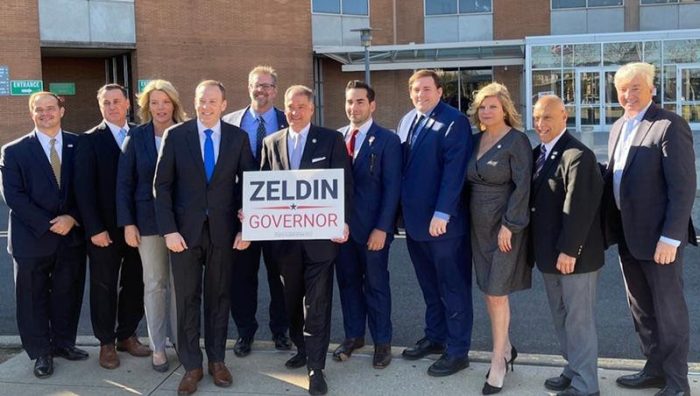Support Healthy School Meals for All bill
Every child deserves to be fed, and in a nation as wealthy as ours, no child should go hungry. The April 20 editorial [“Food before football: Long Island’s uphill battle against childhood hunger”] correctly identifies the crisis of child hunger, and how our government is failing to adequately address the issue. There is a legislative answer to this crisis in New York, and it is the Healthy School Meals for All bill. Our state Legislature and Gov. Kathy Hochul [D] must pass it this year.
The bill ends the policy of means testing, and establishes permanent funding for every child to receive breakfast and lunch at school at no cost. This saves struggling families money on their grocery bills, and eliminates the stigma that may prevent children from utilizing the current program. The cost in New York would be less than 0.01% of the state budget, with $200 million of state dollars supplementing the federal assistance provided to New York. It is estimated that this will provide an additional 726,000 students in New York state access to two meals a day. Currently, one in seven of New York’s children are food insecure, and this disproportionately impacts students of color.
Children are more than just a test score. If a child is hungry, it is difficult for them to learn, to play and to grow. The Healthy School Meals for All legislation addresses the needs of the whole child, and is economic justice for New York’s children and families.
This bill is supported by many organizations across the state. Suffolk Progressives, the group I founded, is a proud supporter of the bill, and I encourage others to join the call to reduce child hunger by asking their lawmakers to sign on. I urge constituents to reach out to state Sens. Anthony Palumbo [R-New Suffolk], Dean Murray [R-East Patchogue] and Mario Mattera [R-St. James], and Assemblywoman Jodi Giglio [R-Riverhead], who are not currently listed as co-sponsors of the bill.
Childhood hunger is not a partisan issue, and all of Long Island’s lawmakers should get behind this legislation. The Legislature must pass Healthy School Meals for All, and Hochul must sign it into law in the 2023 legislative session. New York’s children are depending on it.
Shoshana Hershkowitz
South Setauket
Let’s patronize our local restaurants
Why not patronize your neighborhood restaurants during Long Island Restaurant Week April 23-30 with a wide variety of both two-course lunch and three-course dinner specials all year long.
My wife and I don’t mind occasionally paying a little more to help our favorite restaurants survive. Don’t forget your cook and server. We try to tip 20 to 25 percent against the total bill including taxes. If it is an odd amount, we round up to the next dollar. If we can afford to eat out, we can afford an extra dollar tip. When ordering take out, we always leave a dollar or two for the waiter or cook. It is appreciated.
The restaurant industry employees include hosts, bartenders, waiters, bus boys, cooks, cashiers, parking valets, wholesale food sellers, distributors and linen suppliers. There are also construction contractors who renovate or build new restaurants.
Our local entrepreneurs work long hours, pay taxes and provide local employment especially to students during the summer. If we don’t patronize our local restaurants, they don’t eat either. Why travel into Manhattan when there are so many great neighborhood restaurants in Centereach, Cold Spring Harbor, Commack, Huntington, Mount Sinai, Northport, Port Jefferson, Selden, Smithtown and Stony Brook?
Larry Penner
Great Neck
Maria’s No Mow May campaign
Sadly, Maria Hoffman passed away in 2022. She was someone who was involved in everything and anything that touched our community — historical preservation, open space protection and environmental issues.
There was no issue too large, or too small, that Maria wasn’t part of — and always achieved with a smile on her face.
Her involvement was done with a quiet style and grace, and while her voice was soft and light, her influence was great.
Anyone who enjoys West Meadow Beach, the Setauket to Port Jefferson Station Greenway, the cultural, historical and art institutions in the area — they all need to give special thanks to Maria’s legacy.
Maria was an avid beekeeper.
She loved her bees and maintained a number of hives.
Her eyes sparkled whenever she spoke about bees — she marveled at their unique abilities and intelligence.
And she was deeply concerned about the declining bee populations across the country.
To honor the legacy of Maria and to protect the bee, butterfly and bird populations, the Three Village Community Trust is kicking off its 1st annual Maria’s No Mow May campaign.
No Mow May is an international movement that first was popularized by Plantlife, an organization based in Salisbury, England. The simple goal of No Mow May is to allow grass to grow during the month of May, creating an important spring habitat for early season pollinators. No Mow May is really easy — do nothing!
Don’t apply any fertilizers, herbicides, fungicides or pesticides.
While community residents might not want to leave their entire lawn unmown for the month of May, just allowing a small area to be part of No Mow May will make a difference to the environment.
You’re likely to see yard signs saying “ join Maria’s No Mow May campaign throughout the community.
Join the Three Village Community Trust, your friends and neighbors in Maria’s No Mow May. Just like Maria — bee special!
Herb Mones
President, Three Village Community Trust
Eliminating bail reduces recidivism
A recent letter by Jim Soviero [“Dem Albany County DA Soares criticizes bail reform,” April 6] essentially reprints a New York Post op-ed piece by Albany County DA David Soares deriding bail reform. Soviero takes great pains to emphasize Soares’ political affiliation (Democratic) and race (Black).
As I’m sure Soviero would agree, even Democrats can be wrong sometimes. And regardless of Soares’ race, neither he, nor Rupert Murdoch’s New York Post, nor even Soviero himself are better equipped to decide what’s best for New York’s African-American community than that community itself. Polling shows that the overwhelming majority of Blacks support policies reducing incarceration. If bail reform is as terrible for the African-American community as Soviero’s crocodile tears seem to suggest, there’s a simple remedy — they can vote out of office their representatives who voted for it. That’s not about to happen. Instead, the voices most stridently denouncing reform are those exploiting the politics of fear and division.
If just jailing people made our streets and communities safer, the United States should be the safest country in the world. After all, we lead the world in incarceration, both absolutely and per capita.
As far as the cherry-picked statistics Soares relies on and Soviero repeats to denounce reform, they’re all wet. A study released this March by John Jay College, the preeminent criminal justice school in the state, shows that the 2020 bail reform law has actually reduced the likelihood of someone getting rearrested. “Fundamentally, we found that eliminating bail for most misdemeanors and nonviolent felonies reduced recidivism in New York City, while there was no clear effect in either direction for cases remaining bail eligible,” said Michael Rempel, director of John Jay College’s Data Collaborative for Justice.
All of this obscures the fact that the purpose of bail is for one thing only — to restrain those judged to be a flight risk. It is not to lock up people, sometimes for weeks or months in horrible conditions, who are legally innocent. Unless we are willing to drop the presumption of innocence from our legal system entirely.
I’m sure that Soviero would agree with me that the recently indicted former president is legally entitled to the presumption of innocence. So why is it that he, who is rich and powerful, is entitled to this, but someone who is poor and powerless is not? I don’t know what to call that, but I certainly wouldn’t call it justice.
David Friedman
St. James
Editor’s note: We are publishing this letter because it responds to an earlier letter. In the future, we ask that letters mainly speak to local issues.
Local residents toast George Washington’s visit
This past Saturday local residents gathered on the corner of Bayview Avenue, East Setauket, and Route 25A to commemorate the 233rd year of our first president George Washington’s visit to Setauket on April 22, 1790. Several in attendance read excerpts about Washington and his life, including a poem written by ChatGPT on Washington’s trip to the Roe Tavern in Setauket.
As many know, Washington came to Setauket during the first year of his presidency to meet with Capt. Austin Roe who ran a small tavern on what is now Route 25A near East Setauket Pond Park. Though the president’s diary was sparse about the true intentions for his five-day trip to Long Island, many believe it was to thank those who had been part of the Culper Spy Ring that was founded in Setauket and critical to Washington’s success against the British troops and mercenaries encamped in New York City.
This is the second year that local resident Rick McDowell and his brother Ken organized the gathering. They are already planning next year’s commemoration for another rousing cheer to our first president and to the Setauket spies who helped him win the War of Independence from Britain.
George Hoffman
Setauket
May 1 public hearing on Maryhaven is urgent
It’s concerning that a Village of Port Jefferson public hearing on changes to zoning for the Maryhaven Center of Hope property is still scheduled for May 1.
Especially since the follow-up work session on April 25 raised more questions than answers — even for some of the trustees. Further, from what we understand, the Board of Trustees has not even received a formal request from the developers, and the Building Department has no record of any application. So why the rush?
The village attorney argues that having the zoning hearing now allows the village to be proactive when the developers are ready to apply. But this remedy seems more preemptive than proactive because the residents don’t yet have enough information to make an informed decision.
Not only were we not included in any of the prior discussions, but it does not appear that a full due diligence was conducted.
It might be too late to call for the hearing to be postponed. But it’s not too late to request that no binding decisions on Maryhaven be made until residents have a chance to review the facts and, perhaps, propose other options for the property.
In order to get answers, we urge you to come to the public hearing at Village Hall on Monday, May 1, at 6 p.m.
Ana Hozyainova, President
Kathleen McLane, Outreach Officer
Port Jefferson Civic Association
No interest in changing Port Jeff Country Club to a public course
This is an open letter to the editor, to the members of the Port Jefferson Country Club and to the residents of the Village of Port Jefferson.
It has been brought to my attention by several members of the country club that inaccurate messaging is being shared around the course — that as part of my Port Jefferson mayoral campaign platform, I intend to convert the country club to a public municipal golf course, and make golf at the country club free for all residents. At first, I thought it was a joke. Because nothing could be further from the truth. Then when more people started asking me if it were true, I knew I had to address this publicly.
I have no interest or intent in changing the country club to a public course. I hope those who consider voting for me see through this political ruse and know I would never be so reckless or fiscally irresponsible. It will remain a private municipal course, as it always has been from the day Mayor Harold Sheprow acquired it, and as it was established when the decision to buy it was voted upon favorably in 1978 by the residents of Port Jefferson.
I will always support making the club and its restaurant facilities a welcoming and inclusive environment for all residents. Giving memberships away for free does not enter into that equation.
If PJCC members or village residents have questions and would like to personally discuss this or any information that has the appearance of being contrary to what I stand for — see my website www.sheprowformayor.com under the “platform” tab — I can be reached by email at [email protected].
Lauren Sheprow, Trustee
Village of Port Jefferson
Editor’s note: The writer is the daughter of former Port Jefferson Mayor Harold Sheprow.








